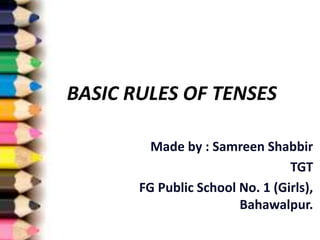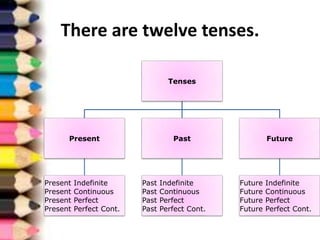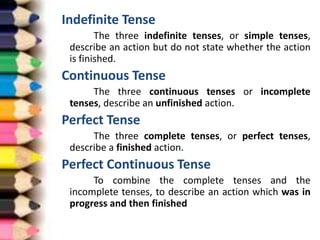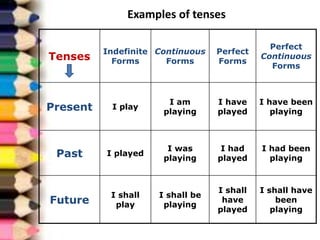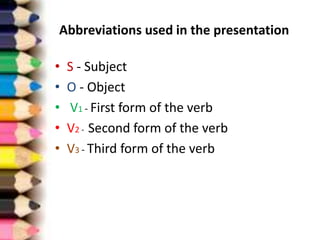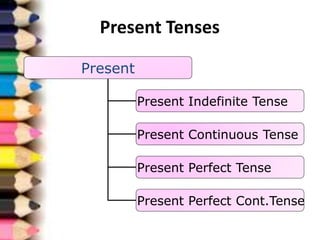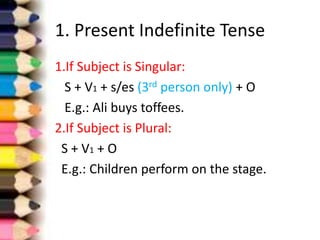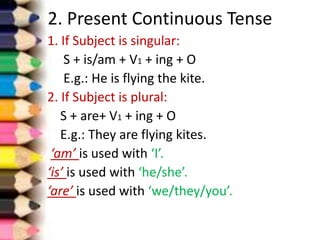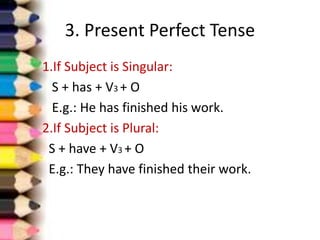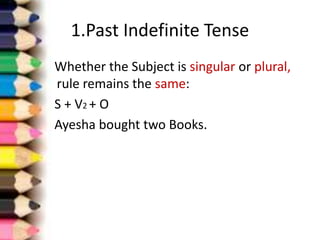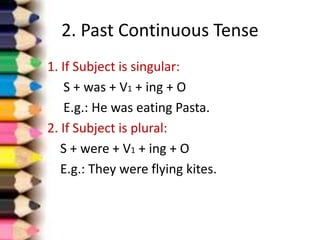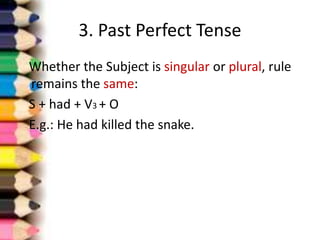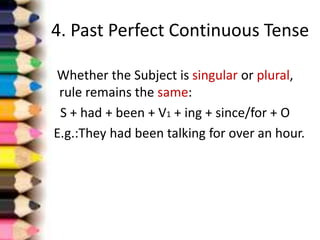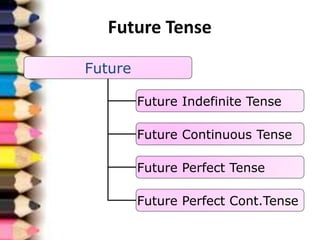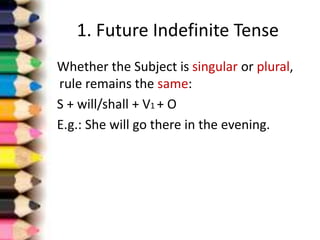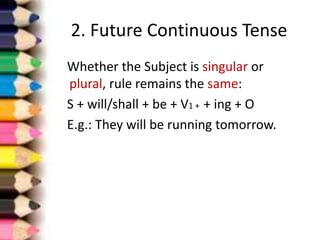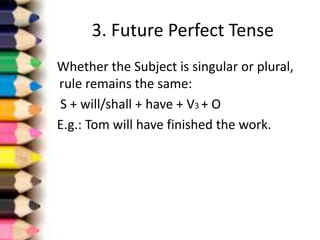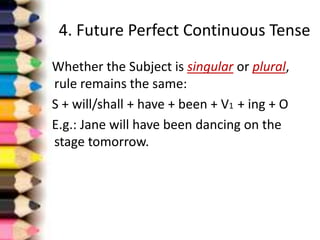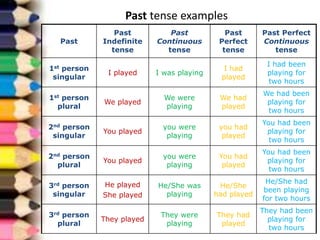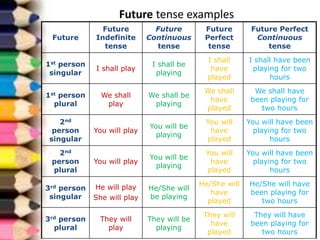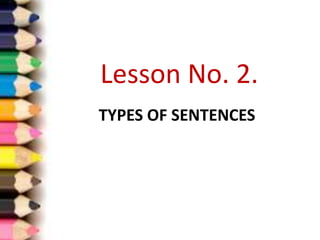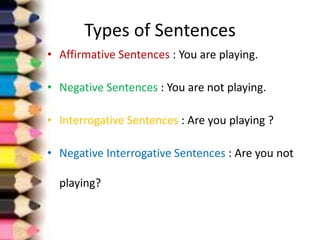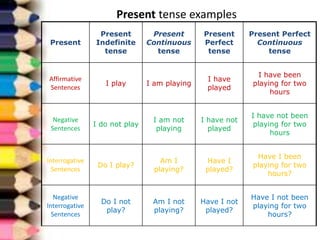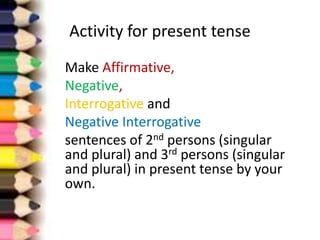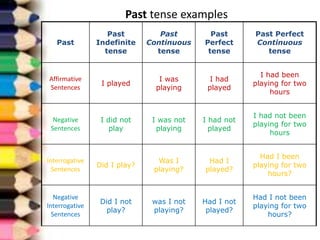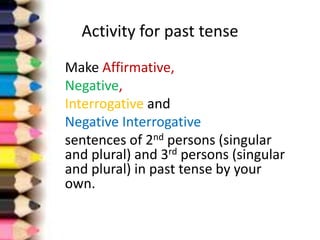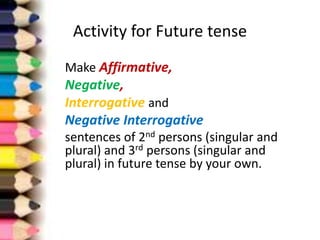Tenses lesson no. 2
- 1. BASIC RULES OF TENSES Made by : Samreen Shabbir TGT FG Public School No. 1 (Girls), Bahawalpur.
- 2. There are twelve tenses. Tenses Present Present Indefinite Present Continuous Present Perfect Present Perfect Cont. Past Past Indefinite Past Continuous Past Perfect Past Perfect Cont. Future Future Indefinite Future Continuous Future Perfect Future Perfect Cont.
- 3. Indefinite Tense The three indefinite tenses, or simple tenses, describe an action but do not state whether the action is finished. Continuous Tense The three continuous tenses or incomplete tenses, describe an unfinished action. Perfect Tense The three complete tenses, or perfect tenses, describe a finished action. Perfect Continuous Tense To combine the complete tenses and the incomplete tenses, to describe an action which was in progress and then finished
- 4. Examples of tenses Tenses Indefinite Forms Continuous Forms Perfect Forms Perfect Continuous Forms Present I play I am playing I have played I have been playing Past I played I was playing I had played I had been playing Future I shall play I shall be playing I shall have played I shall have been playing
- 5. Abbreviations used in the presentation âĒ S - Subject âĒ O - Object âĒ V1 - First form of the verb âĒ V2 - Second form of the verb âĒ V3 - Third form of the verb
- 6. Present Tenses Present Present Indefinite Tense Present Continuous Tense Present Perfect Tense Present Perfect Cont.Tense
- 7. 1. Present Indefinite Tense 1.If Subject is Singular: S + V1 + s/es (3rd person only) + O E.g.: Ali buys toffees. 2.If Subject is Plural: S + V1 + O E.g.: Children perform on the stage.
- 8. 2. Present Continuous Tense 1. If Subject is singular: S + is/am + V1 + ing + O E.g.: He is flying the kite. 2. If Subject is plural: S + are+ V1 + ing + O E.g.: They are flying kites. âamâ is used with âIâ. âisâ is used with âhe/sheâ. âareâ is used with âwe/they/youâ.
- 9. 3. Present Perfect Tense 1.If Subject is Singular: S + has + V3 + O E.g.: He has finished his work. 2.If Subject is Plural: S + have + V3 + O E.g.: They have finished their work.
- 10. 4. Present Perfect Continuous Tense 1.If Subject is Singular: S + has + been + V1 + ing + since/for + O E.g.: He has been dancing for four hours. 2.If Subject is Plural: S + have + V1 + ing + since/for + O E.g.: We have been doing the work since 7:00a.m.
- 11. Past Tenses Past Past Indefinite Tense Past Continuous Tense Past Perfect Tense Past Perfect Cont.Tense
- 12. 1.Past Indefinite Tense Whether the Subject is singular or plural, rule remains the same: S + V2 + O Ayesha bought two Books.
- 13. 2. Past Continuous Tense 1. If Subject is singular: S + was + V1 + ing + O E.g.: He was eating Pasta. 2. If Subject is plural: S + were + V1 + ing + O E.g.: They were flying kites.
- 14. 3. Past Perfect Tense Whether the Subject is singular or plural, rule remains the same: S + had + V3 + O E.g.: He had killed the snake.
- 15. 4. Past Perfect Continuous Tense Whether the Subject is singular or plural, rule remains the same: S + had + been + V1 + ing + since/for + O E.g.:They had been talking for over an hour.
- 16. Future Tense Future Future Indefinite Tense Future Continuous Tense Future Perfect Tense Future Perfect Cont.Tense
- 17. 1. Future Indefinite Tense Whether the Subject is singular or plural, rule remains the same: S + will/shall + V1 + O E.g.: She will go there in the evening.
- 18. 2. Future Continuous Tense Whether the Subject is singular or plural, rule remains the same: S + will/shall + be + V1 + + ing + O E.g.: They will be running tomorrow.
- 19. 3. Future Perfect Tense Whether the Subject is singular or plural, rule remains the same: S + will/shall + have + V3 + O E.g.: Tom will have finished the work.
- 20. 4. Future Perfect Continuous Tense Whether the Subject is singular or plural, rule remains the same: S + will/shall + have + been + V1 + ing + O E.g.: Jane will have been dancing on the stage tomorrow.
- 21. Present Present Indefinite tense Present Continuous tense Present Perfect tense Present Perfect Continuous tense 1st person singular I play I am playing I have played I have been playing (for two hours) 1st person plural We play We are playing We have played We have been playing for two hours 2nd person singular You play You are playing You have played You have been playing for two hours 2nd person plural You play You are playing You have played You have been playing for two hours 3rd person singular He plays She plays He/She is playing He/She has played He/She has been playing for two hours 3rd person plural They play They are playing They have played They have been playing for two hours Present tense examples
- 22. Past tense examples Past Past Indefinite tense Past Continuous tense Past Perfect tense Past Perfect Continuous tense 1st person singular I played I was playing I had played I had been playing for two hours 1st person plural We played We were playing We had played We had been playing for two hours 2nd person singular You played you were playing you had played You had been playing for two hours 2nd person plural You played you were playing You had played You had been playing for two hours 3rd person singular He played She played He/She was playing He/She had played He/She had been playing for two hours 3rd person plural They played They were playing They had played They had been playing for two hours
- 23. Future tense examples Future Future Indefinite tense Future Continuous tense Future Perfect tense Future Perfect Continuous tense 1st person singular I shall play I shall be playing I shall have played I shall have been playing for two hours 1st person plural We shall play We shall be playing We shall have played We shall have been playing for two hours 2nd person singular You will play You will be playing You will have played You will have been playing for two hours 2nd person plural You will play You will be playing You will have played You will have been playing for two hours 3rd person singular He will play She will play He/She will be playing He/She will have played He/She will have been playing for two hours 3rd person plural They will play They will be playing They will have played They will have been playing for two hours
- 24. TYPES OF SENTENCES Lesson No. 2.
- 25. Types of Sentences âĒ Affirmative Sentences : You are playing. âĒ Negative Sentences : You are not playing. âĒ Interrogative Sentences : Are you playing ? âĒ Negative Interrogative Sentences : Are you not playing?
- 26. Present tense examples Present Present Indefinite tense Present Continuous tense Present Perfect tense Present Perfect Continuous tense Affirmative Sentences I play I am playing I have played I have been playing for two hours Negative Sentences I do not play I am not playing I have not played I have not been playing for two hours Interrogative Sentences Do I play? Am I playing? Have I played? Have I been playing for two hours? Negative Interrogative Sentences Do I not play? Am I not playing? Have I not played? Have I not been playing for two hours?
- 27. Activity for present tense Make Affirmative, Negative, Interrogative and Negative Interrogative sentences of 2nd persons (singular and plural) and 3rd persons (singular and plural) in present tense by your own.
- 28. Past tense examples Past Past Indefinite tense Past Continuous tense Past Perfect tense Past Perfect Continuous tense Affirmative Sentences I played I was playing I had played I had been playing for two hours Negative Sentences I did not play I was not playing I had not played I had not been playing for two hours Interrogative Sentences Did I play? Was I playing? Had I played? Had I been playing for two hours? Negative Interrogative Sentences Did I not play? was I not playing? Had I not played? Had I not been playing for two hours?
- 29. Activity for past tense Make Affirmative, Negative, Interrogative and Negative Interrogative sentences of 2nd persons (singular and plural) and 3rd persons (singular and plural) in past tense by your own.
- 30. Future tense examples Future Future Indefinite tense Future Continuous tense Future Perfect tense Future Perfect Continuous tense Affirmative Sentences I shall play I shall be playing I shall have played I shall have been playing for two hours Negative Sentences I shall not play I shall not be playing I shall not have played I shall not have been playing for two hours Interrogative Sentences Shall I play? Shall I be playing? Shall I have played? Shall I have been playing for two hours? Negative Interrogative Sentences Shall I not play? Shall I not be playing? Shall I not have played? Shall I not have been playing for two hours?
- 31. Activity for Future tense Make Affirmative, Negative, Interrogative and Negative Interrogative sentences of 2nd persons (singular and plural) and 3rd persons (singular and plural) in future tense by your own.

